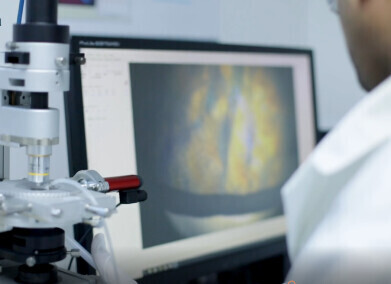Laboratory products
Ensuring API compatibility for successful formulation development
Mar 14 2024
In the pharmaceutical industry, the successful development of a new drug product hinges on the compatibility between the active pharmaceutical ingredient (API) and its formulation. Early characterisation of the API is crucial for the avoidance of common formulation challenges and delays later in the development process.
Freeze drying, aka lyophilisation, is a widely used technique for preserving pharmaceutical products. It removes water from a product while maintaining its integrity and stability. Freeze-dried products offer several advantages, including:
- Enhanced stability at room temperature: This reduces or eliminates the need for cold chain storage, simplifying product distribution and logistics.
- Rapid reconstitution: Freeze-dried products can be quickly reconstituted with water or another solvent for administration.
- Improved dosage accuracy: The precise dosing of freeze-dried products makes them ideal for applications requiring accurate delivery of potent medications.
Why is API compatibility essential for freeze drying?
While freeze drying offers numerous benefits, a lack of compatibility between the API and its formulation can lead to significant challenges, including:
- Product instability: Incompatible excipients can cause the API to degrade during storage, rendering the product ineffective.
- Cake collapse: During freeze drying, the API and excipients form a concentrated ‘cake’. If the API is incompatible with the formulation, the cake can collapse, compromising product stability and appearance.
- Slow or incomplete reconstitution: If the API doesn't readily dissolve in the chosen solvent, reconstitution will be slow or incomplete, impacting product usability.
Approaches to ensure API compatibility
To ensure successful freeze drying and formulation development, pharmaceutical scientists employ various analytical techniques to assess API compatibility. These techniques include:
- Solubility studies: Evaluating the API's solubility in different solvents and excipient solutions helps identify compatible formulation components.
- Critical event analyses: Techniques such as freeze drying microscopy (FDM), using a Lyostat5, can reliably identify collapse temperate (Tc) in amorphous products and eutectic temperatures (Teu) in crystalline solutions to reveal physical changes in the API-excipient mixture during freeze drying, indicating potential incompatibilities.
- Thermal and impedance analysis (Zsinφ):, Using a Lyotherm. indicates the sample’s molecular mobility, including events not picked up by traditional thermal methods like DTA or DSC alone.
- Stability testing: Long-term stability studies under various storage conditions are essential to ensure the final product remains potent and effective.
By prioritising API characterisation and employing appropriate analytical techniques from the outset, pharmaceutical scientists can ensure compatibility between the API and its formulation. This proactive approach lays the foundation for successful freeze drying process development, leading to the production of high-quality, stable, and effective products.
Key takeaways
- Early characterisation of the API is critical for identifying potential formulation challenges.
- Freeze drying offers several advantages for pharmaceutical products, including stability, rapid reconstitution, and improved dosage accuracy.
- API compatibility is essential to prevent product instability, cake collapse, and slow reconstitution post process.
- Analytical techniques like solubility studies, thermal analysis, FDM analysis, and stability testing are employed to assess API compatibility.
By understanding the potential challenges and employing the right techniques, formulators can ensure successful development of stable and effective products. Contact Biopharma Group’s specialists today.
More information online
Digital Edition
Lab Asia 32.1 Feb 2025
February 2025
Chromatography Articles - Comparing volumetric and thermal flowmeters for assessing and validating liquid chromatography performance Mass Spectrometry & Spectroscopy Articles - The importa...
View all digital editions
Events
Mar 01 2025 Boston, MA, USA
Mar 02 2025 Bethesda, MD, USA
Mar 04 2025 Berlin, Germany
Mar 17 2025 Milan, Italy
Mar 18 2025 Beijing, China























